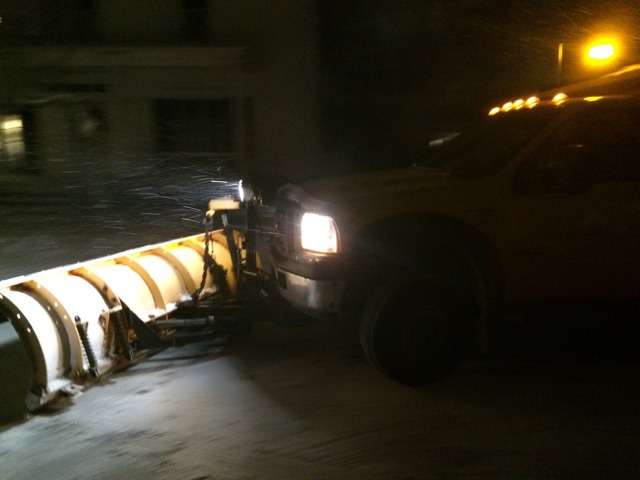The first major snowstorm of the winter appears on track to leave upwards of a foot of snow in East Greenwich. The good news? There are a couple of things, said Town Manager Andy Nota Friday. First, the weather is cold, which makes for lighter snow, which makes for easier removal (as well as safer conditions for the plow drivers). And, second, the storm is scheduled to take place on a single weekend day, so most of us can hunker down with all the food we bought on Friday.
A parking ban starts at 10 p.m. Friday and will go at least into Sunday. Nota said the town wants parked cars off the road but won’t start towing until sometime in the early morning hours of Saturday, after businesses have closed for the night.
Nota is asking residents to exercise some patience in terms of how quickly their street gets plowed. The Department of Public Works is down a couple of workers. Actually, filling those full-time-w/benefits jobs has been tough, he said. Three times, the town has hired men who then quit before they even started or, in one instance, didn’t make it through the first day. They have hired one new worker but he doesn’t start for a couple of weeks. So, said Nota, if your street isn’t plowed as quickly as usual, that may be because the driver for that route is out and it will have to be picked up by other plow drivers after they finish their routes.
In general, said Nota, the town is in good shape. “The guys have been ready. This has been a light snow year so far. And there is plenty of sand for the roadways.”
Nota said there will also be extra police and fire on during the storm.
Meanwhile, the state Department of Health issued some storm-related cautions about shoveling, and, in the event of a power outage, heating and food safety. Here’s hoping that light snow means we won’t have to worry about those last two but here are the guidelines, just in case:
Shoveling
Snow shoveling can cause sudden increases in blood pressure and heart rate, increasing the risk of heart attacks. Shoveling can also cause shoulder and back injuries.
Before shoveling:
- Talk to your doctor if you have a history of heart trouble to make sure it is safe for you to shovel snow.
- Drink plenty of water. You can get dehydrated in cold weather, too.
- Dress warmly, and dress in several layers.
- Avoid alcohol, caffeine, and nicotine.
- Warm up the muscles in your arms and legs. Walk around for a few minutes and stretch your arms and legs.
While shoveling:
- Take it slow, pace yourself, and take breaks.
- Don’t pick up too much snow at once. Use a smaller shovel, or only fill the shovel part way if you use a large shovel.
- Protect your back. Bend from the knees and lift with your legs bent. Stand with your feet about hip width apart for good balance and keep the shovel close to your body.
- Try not to twist. If you need to move snow to one side, move your feet to face the direction you are throwing the snow.
- Listen to your body. Stop if you feel tired or feel tightness in your chest.
- Call 911 if you or someone you are with is experiencing the symptoms of a heart attack (chest pain or pressure; sweating; shortness of breath; nausea or vomiting; pain, pressure, or a strange feeling in the back, neck, jaw, or upper belly, or in one or both shoulders or arms; lightheadedness or sudden weakness; a fast or irregular heartbeat).
Heating
Carbon monoxide is invisible and odorless. It can cause loss of consciousness or death. The most common symptoms of carbon monoxide poisoning are headache, dizziness, weakness, nausea, vomiting, chest pain, and confusion.
- Never use a gas range or oven to heat your house. Do not use a charcoal grill, hibachi, lantern, or portable camping stove inside your house.
- If you need to use a generator, make sure it is properly installed and vented.
- If you lose power and it is too cold inside your house, go to a friend or family’s home or go to a warming center. Call 211 for a list of warming centers.
Babies should always sleep alone in their own sleep environment, even if the heat is lost in a home. Bed sharing is extremely dangerous. A parent can roll over and prevent the baby from breathing, or the baby can get trapped between the wall and the bed.
Babies typically need one more layer of clothing than adults. If your baby seems cold, the baby should be swaddled in a blanket, or dressed in an additional outfit.
Food safety during and after any power outages
During power outages, the food items that are of greatest concern are moist, perishable foods. Bacteria can easily grow on this food.
If you believe that you could lose power, turn the refrigerator and freezer to the coldest setting. If you lose power, keep refrigerator and freezer doors closed as much as possible.
Power outages of more than four hours may be hazardous to food. If the food temperature is greater than 41 degrees Fahrenheit, or you do not know the food temperature, it is best to throw it out. In other words, when in doubt, throw it out.
For more winter health tips, see https://health.ri.gov/seasonal/winter. For help preparing for winter storms and extreme cold, see https://health.ri.gov/publications/guidelines/preparing-for-winter.pdf.






 Subscribe
Subscribe